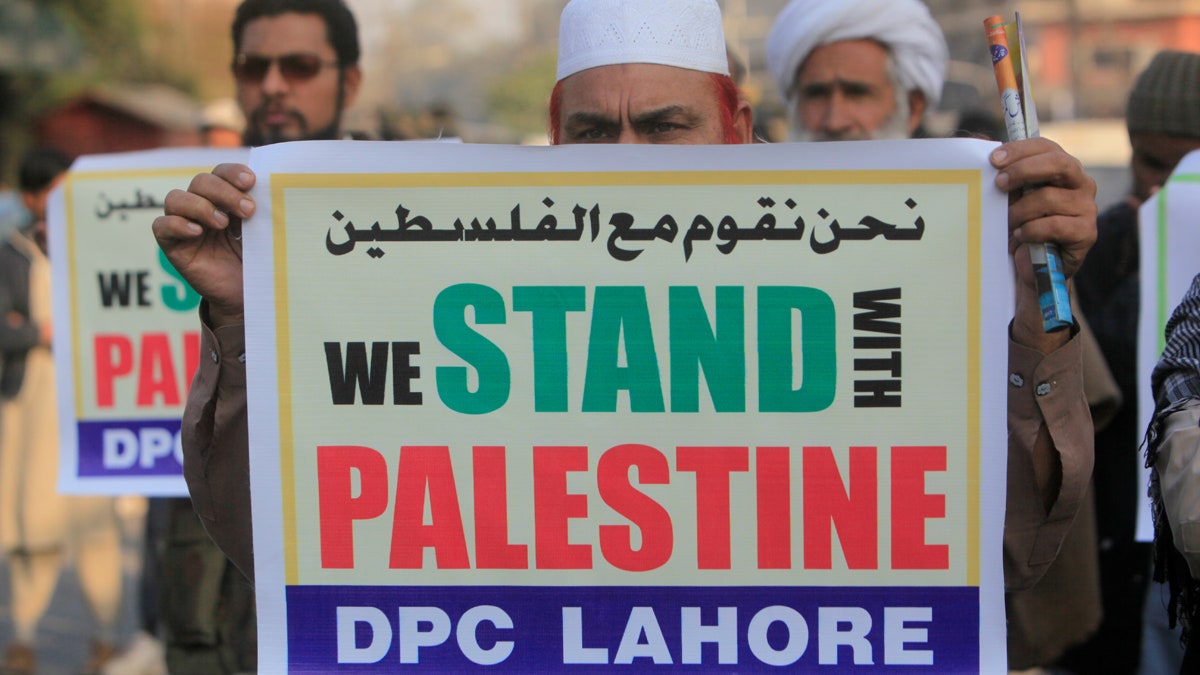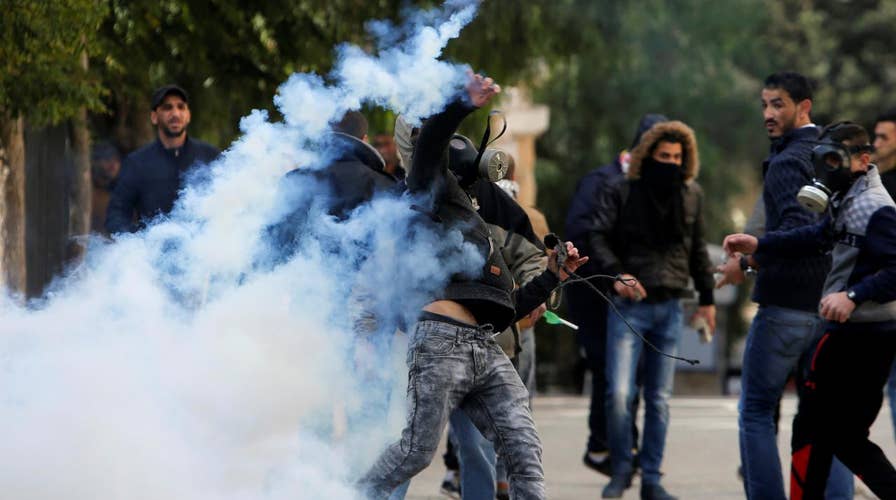Trump’s Jerusalem speech sparks violent Mideast protests
Palestinian protesters clash with Israeli authorities in the West Bank and Gaza strip after President Trump makes a controversial speech deeming Jerusalem the capital of Israel and the future home of the American Embassy.
Hundreds of Palestinians clashed with Israeli troops who deployed tear gas and stun grenades during a second day of demonstrations against U.S. President Donald Trump’s decision to recognize Jerusalem as the capital of Israel and relocate the American embassy.
Demonstrations that began in the morning as largely peaceful and muted took a more violent turn in the afternoon as hundreds of residents in the West Bank cities of Rahhallah and Bethlehem vented their frustration with Trump’s decision to break with decades of U.S. policy and long-standing international assurances that Jerusalem’s fate would be decided in negotiations with Israel—which captured the eastern half of the city in 1967.
Protesters set fire to tires, hurled stones at troops in riot gear, burned U.S. flags and chanted anti-American and anti-Trump slogans. Troops fired water cannons and tear gas in Bethlehem and in Rahmallah, the seat of the Palestinian government. Fires set by protesters sent a plume of black smoke over the city. A truck reportedly plowed into a group of protesters in the city of Beit Jala.
In the Gaza Strip, Hamas leader Ismail Haniyeh called on Palestinians to launch a new intifada, or uprising, against Israel on Friday.
Hamas, a terrorist group that seeks Israel's destruction, killed hundreds of Israelis in suicide bombings and other attacks in the early 2000s. But the group's capabilities are more limited now. Gaza, Hamas' stronghold, is closed by an Israeli blockade while in the West Bank many of its members have been arrested. Nonetheless, it possesses a large arsenal of rockets capable of striking much of Israel.
The U.S. State Department advised Americans to avoid Jerusalem’s Old City and the West Bank in anticipation of Trump’s decision.
TRUMP OFFICIALLY RECOGNIZES JERUSALEM AS ISRAEL'S CAPITAL, ORDERS EMBASSY MOVE FOR US
Trump was warned that these clashes were likely. However, the question is whether they last for a few days or morph into a sustained uprising.
The Israeli military said it would deploy several battalions to the West Bank ahead of Friday, while other troops have been put on alert to address "possible developments."
The conflicting claims to Jerusalem, and especially its Old City, where sensitive Jewish, Muslim and Christian holy sites are located, lie at the core of the Israeli-Palestinian conflict. Although Trump's decision had no immediate impact on the city's daily life, it carried symbolic meaning, and was seen as siding with Israel and an attempt to impose a solution on the Palestinians.
Israel, which claims all of Jerusalem as its undivided capital, welcomed Trump's decision.
Negative reaction in the Arab world and parts of Europe about Trump’s decision was swift.
Turkey, where thousands of people took to the streets late on Dec. 6, called Trump’s move “irresponsible.”
Qatar’s foreign minister said Trump’s undertaking was “a death sentence for all those who seek peace.”

Demonstrators hold placards during a protest following U.S. President Donald Trump's announcement that he has recognized Jerusalem as Israel's capital, in Lahore, Pakistan, Dec. 7, 2017. (Reuters)
“This can rock global security and stability,” Indonesian President Joko Widodo, leader of the world's largest Muslim-majority nation, told a news conference in which he called for the United States to reconsider its decision, reports Yahoo! News.
French President Emmanuel Macron said he didn’t support America’s “unilateral” move, while British Prime Minister Theresa May said through a spokesman that she disagreed with Trump’s embrace of Jerusalem as Israel’s capital before a peace agreement could be signed in the region.
U.S. embassies across much of the Middle East and parts of Africa warned American citizens of possible protests following Trump's move.
Palestinian President Mahmoud Abbas has suggested that with Trump's move, the United States disqualified itself as mediator between Israelis and Palestinians, a role it has played exclusively in more than two decades of stop-and-go negotiations aimed at setting up a Palestinian state alongside Israel.
“With its decision, the U.S. has isolated itself and Israel, and has pushed the area into a dangerous situation and stopped the peace process,” said Nabil Abu Rdeneh, a senior Abbas aid. “Without a doubt, this decision will not help at all in solving the problems in the area, but rather strengthen the extremists.”
The Associated Press and Fox News Foreign Correspondent Conor Powell contributed to this report.









































